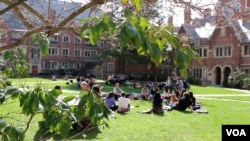Editor's Note: This story is part of a continuing series about international student life at colleges and universities across the United States. Please join us over the next several weeks as we bring you stories about international students and the American higher education system as a whole.
Wissem Gamra felt very different from other students when he began studying at Yale University in New Haven, Connecticut.
Gamra was born in Sousse, Tunisia. He lived there until he was 17 years old. But in his third year of high school, he learned of a chance to study at an organization called the African Leadership Academy.
The African Leadership Academy is a special school in Johannesburg, South Africa. It trains students from across the continent to become future leaders who work to solve problems in Africa. It also helps students find money so they can pay for an education at top universities around the world.
So in 2012, Gamra went to Johannesburg to complete his high school education. Then he sought admission to Yale University to study electrical engineering.
Yale is a private research university, created in 1701. It is also an Ivy League school, meaning it is one of eight private colleges and universities in the northeastern United States. The eight are widely considered to be some of the best schools in the world.
Five former U.S. presidents completed study programs at Yale University.
Ivy League schools only accept a small number of students from among the thousands who seek admission. When Yale accepted Gamra in 2014, he became its first ever undergraduate student from Tunisia.
Gamra says he felt it was his responsibility to represent his country as best he could.
"I don’t really feel that people treated me differently. It’s just that sometimes people, when I tell them where I’m from, people would not where it is. And I take that as a good teaching opportunity for them, so that I teach them more about Tunisia."
However, Gamra says he faced some difficulties in dealing with the cultural differences between his homeland and the United States. For example, drinking alcohol at parties is common for many American college students. But many Tunisians are Muslim, and Islam has strong rules against drinking alcohol.
Also, Gamra says some Americans have misunderstandings about developing countries. For example, during his first year at Yale, Gamra went to dinner with the parents of one of his American friends. After the meal, his friend’s mother told Gamra how sad it was that people in the U.S. waste so much food while people living in other countries starve. Then she gave him the leftover food from their meal. Gamra thought she did this because she thought he did not have enough money for food, which he found a little insulting.
Yet Gamra says this was just one bad example. He worked hard to make more American friends and share greater understanding of his culture. He did so by joining different student organizations at Yale. He is a member of Bulldogs Racing. This group of students spends an entire year building a race car to compete against teams from other universities.
Also, Gamra joined Bulldog Productions. This is a Yale undergraduate student-operated film and theater production group. Gamra says he never did anything involving theater before coming to the United States. But he started designing theater sets when he joined Bulldog Productions in his first year. And in fall 2016, he was the lead producer of a musical production called “Drakorian.”
Gamra says he is doing things he never would have dreamed of doing at a university in his home country. In Tunisia, an electrical engineering student attends classes in electrical engineering, but usually does little else.
Melissa Castera says she chose Yale University because of the opportunities it provides to students outside their main field of study. She began working toward a master’s degree in environmental management in 2015.
Castera is from the town of Salto, Uruguay. She earned her undergraduate degree in civil engineering from the University of the Republic in Montevideo in 2008. Several years later, she decided she wanted to have an international experience to expand her understanding of the world.
So Castera decided to seek a Fulbright scholarship. This is a program supported by the U.S. Department of State. It gives money to American students and professors to study and teach in other countries. It also gives money to international students and professors who want to study and teach at American colleges or universities.
Studying overseas is not common for students from Uruguay, Castera says. So when she received her scholarship and learned Yale had accepted her, many of her friends were shocked.
"They were like, ‘What? Where are you going? Like, how come? Like, when did you decide that? They were all very surprised that this was happening. But also, like, when I would say ‘Yale,’ they’d say, ‘Wow. How did you get into that? Like, we are coming from a so small country. Do they know where is Uruguay?’"
Since she began studying at Yale, Castera says she has welcomed the difficulty of the work. She already had learned a lot about planning cities and development from her undergraduate studies. She chose to study environmental management because she wanted to learn more about how to protect water resources. But her program at Yale has forced her to learn about so much more, including politics and economics.
Castera says that by examining other fields of study, she has had to think in ways she never had to before. And the ways in which she has had to use that knowledge, including public speaking, have pushed her out of her comfort zone. Now she feels she can express herself more in English and in Spanish.
Yale has also provided Castera with the chance to see the world as she had not seen it before. As part of her program, the school required her to serve as an intern. So last summer, she joined the World Resources Institute to research water usage in Brazil. And in the spring of 2017, she went on a school trip to Israel and the Palestinian territories to study how they deal with water disputes.
After completing her education, Castera says she wants to work to solve problems related to climate change. This is an issue she says she never knew much or thought about before coming to Yale.
I’m Pete Musto.
And I'm Dorothy Gundy.
Pete Musto reported this story for VOA Learning English. Lucija Milonig produced the video. George Grow was the editor.
We want to hear from you. How do universities in your country help you to explore subjects and activities you do not know much about? What other opportunities do you think you would find at a university in the U.S.? Write to us in the Comments Section or on our Facebook page.
________________________________________________________________
Words in This Story
admission – n. the act or process of accepting someone as a student at a school
undergraduate – adj. used to describe a student at a college or university who has not yet earned a degree
opportunity – n. an amount of time or a situation in which something can be done
leftover – adj. used to describe food that has not been finished at a meal and that is often served at another meal
set(s) – n. the rooms, painted backgrounds and furniture that are used for a scene in a movie, television program, or play
master’s degree – n. a degree that is given to a student by a college or university usually after one or two years of additional study following a bachelor's degree
scholarship – n. an amount of money that is given by a school or organization to a student to help pay for the student's education
comfort zone – n. a place, situation, or level where someone feels that they can do something well or succeed at something and has no worries, difficulty, or uncertainty
intern – n. a student or recent graduate who works for a period of time at a job in order to get experience








